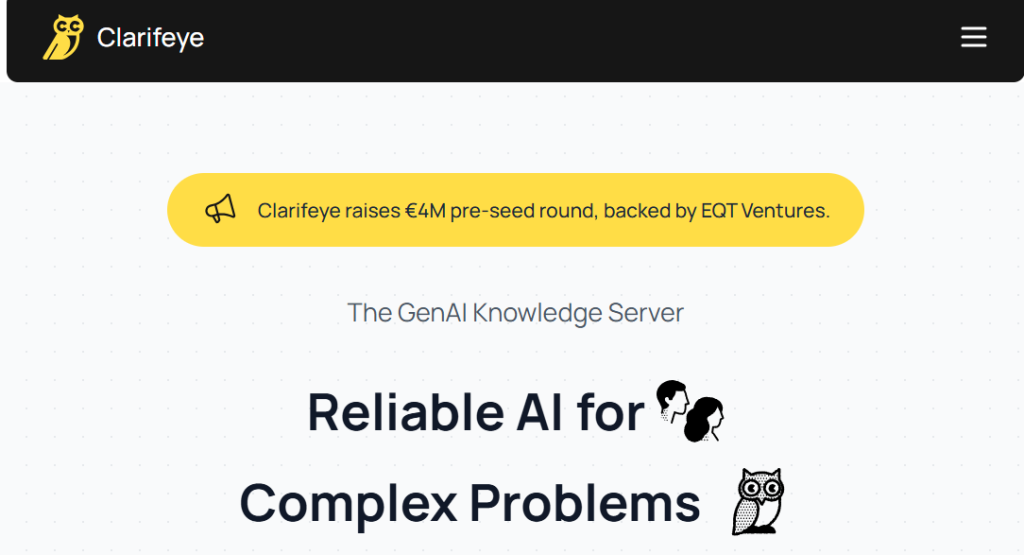Clarifeye Raises $4.7M Pre-Seed to Transform Healthcare Diagnostics
October 2, 2025
byFenoms Start-Ups

Clarifeye, a Paris-based healthtech startup, has successfully raised $4,693,900 in Pre-Seed funding led by EQT Ventures & Growth, Drysdale Ventures, alongside prominent angel investors including Olivier Pomel (Datadog), Jean-Luc Robert (Kyriba), and Alexandre Berriche (Fleet). This early backing highlights strong conviction in Clarifeye’s potential to reshape the way healthcare diagnostics are delivered and interpreted.
Founded by Mathieu Grisolia, Clarifeye is tackling one of the most persistent bottlenecks in modern healthcare: the lag between diagnostic data collection and actionable insights. By leveraging cutting-edge AI models designed to improve both speed and accuracy, the company is positioning itself at the intersection of data science, patient outcomes, and clinical efficiency.
Why This Pre-Seed Round Matters
For most startups, a Pre-Seed round is about proving product-market fit. For Clarifeye, however, this raise goes beyond validation - it’s about establishing credibility in an industry where precision and trust are non-negotiable. Healthcare stakeholders are notoriously risk-averse, and adoption only happens when solutions are both technically robust and clinically sound.
By securing investors who have previously scaled global SaaS, fintech, and healthcare ventures, Clarifeye gains not only capital but also access to operational expertise, networks of hospital systems, and regulatory know-how. This alignment sets the stage for accelerated product development and early pilot programs with institutions eager to modernize diagnostics.
The Bigger Vision
At its core, Clarifeye is building a platform that allows clinicians to interpret medical data faster and more accurately than traditional methods. Whether through imaging, lab tests, or integrated hospital data, the company’s approach is to reduce time-to-diagnosis without compromising reliability.
The vision is not to replace doctors but to augment decision-making, enabling healthcare professionals to allocate their time where it matters most - direct patient care. This type of augmentation aligns perfectly with the broader AI-in-healthcare movement, which is expected to save billions annually by streamlining administrative and clinical workflows.
A Critical Insight for Founders in Healthtech
Many early healthtech startups get caught in a trap: they focus exclusively on building advanced algorithms while neglecting the infrastructure around adoption. Hospitals and clinics don’t just want an algorithm - they want an end-to-end solution that fits seamlessly into existing workflows, integrates with electronic health records (EHR), and provides clear ROI in both financial and patient-care terms.
The true differentiator often lies not in the core technology but in the implementation model. Startups that bake in interoperability early on - ensuring compatibility with EHR systems like Epic, Cerner, or Allscripts - can shorten adoption cycles by years. This is where the most successful founders stand apart: they understand that in healthcare, selling “just AI” is not enough. The winners create plug-and-play systems that remove friction for overburdened hospitals and overworked clinicians.
For founders, this means thinking about integration, regulatory compliance, and billing structures as early as Pre-Seed. Neglecting this foundation often results in stalled pilots and lost momentum, whereas embedding these considerations early signals maturity to investors and makes enterprise sales dramatically smoother.
Why Investors See the Opportunity
The syndicate backing Clarifeye is telling. EQT Ventures & Growth is one of Europe’s most respected growth capital firms, with a history of scaling technology companies across markets. Drysdale Ventures brings operational insight in early-stage tech, while angels like Olivier Pomel bring firsthand experience of scaling category-defining companies in regulated and mission-critical industries.
This alignment of investors suggests Clarifeye isn’t just chasing a niche - it’s preparing to build infrastructure that could support global adoption. With this network, Clarifeye gains the capital, mentorship, and connections necessary to expand quickly into hospital systems across Europe and eventually North America.
The Healthcare AI Landscape
Healthcare AI has already demonstrated massive promise, but the market is still in its early innings. According to Grand View Research, the global AI in healthcare market was valued at $22.4 billion in 2023 and is projected to grow at a 37.5% CAGR through 2030, reaching more than $200 billion.
The fastest-growing segments include:
- Medical imaging & diagnostics, where AI reduces interpretation errors and improves speed.
- Predictive analytics, used for population health management and preventive care.
- Clinical workflow automation, reducing time wasted on repetitive administrative tasks.
Europe, in particular, is experiencing rapid adoption due to its emphasis on cost efficiency and patient safety, making Clarifeye’s Paris roots a strategic advantage. With EU regulations increasingly encouraging interoperability and digital health solutions, startups in this space are well positioned to scale rapidly if they can meet compliance standards.
The Road Ahead for Clarifeye
This Pre-Seed round is the first step in what could become a multi-stage journey toward global healthcare impact. The company will likely focus on:
- Expanding its engineering and clinical research teams to refine algorithms and ensure clinical accuracy.
- Running pilot programs with hospitals and labs to validate usability and outcomes.
- Pursuing regulatory clearances in Europe, with an eventual eye on FDA approval for U.S. market entry.
- Building interoperability frameworks with existing hospital IT infrastructure to smooth deployment.
If executed correctly, Clarifeye could emerge as a central player in the rapidly expanding healthcare AI sector - one that not only improves diagnostics but also redefines the relationship between clinicians and data.









